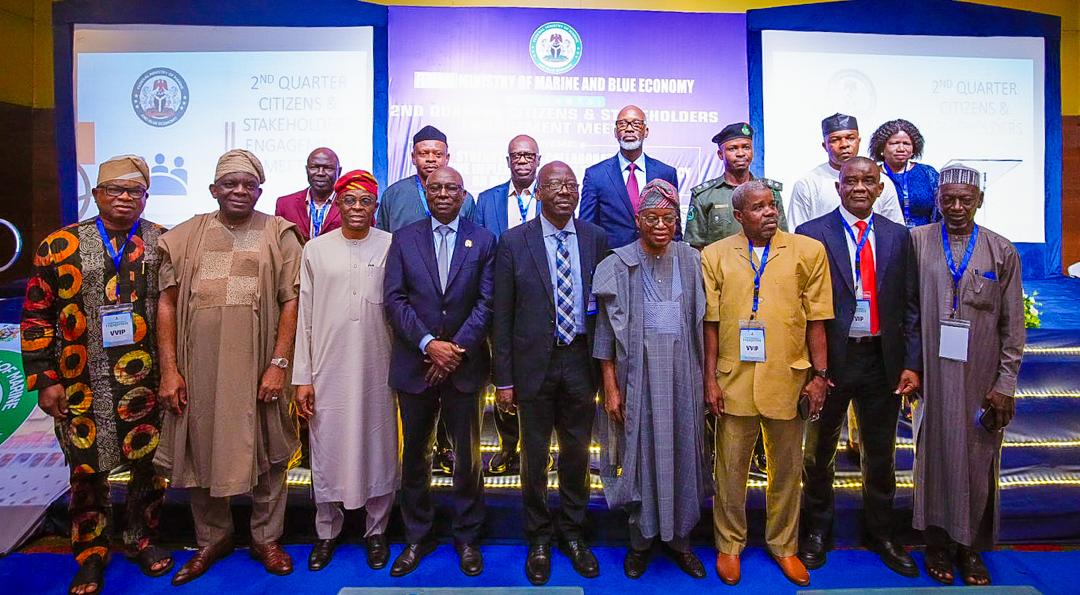The Minister of Marine and Blue Economy, Adegboyega Oyetola, led a high-level Citizens and Stakeholders Forum on Thursday at Eko Hotels and Suites, Victoria Island, Lagos, aimed at accelerating the implementation of the recently approved National Policy on Marine and Blue Economy.
The engagement, convened under the theme “Strengthening Collaboration for Effective Implementation of the National Policy on Marine and Blue Economy”, brought together key actors across government, industry, academia, and civil society in a bid to forge a unified, action-oriented strategy for the marine sector’s transformation.
Delivering the keynote address, Minister Oyetola emphasised that the creation of the Federal Ministry of Marine and Blue Economy represents one of the boldest and most forward-thinking reforms under President Bola Ahmed Tinubu’s Renewed Hope Agenda.
He described the Federal Executive Council’s approval of the National Policy on Marine and Blue Economy as a major turning point, offering a structured framework to unlock value across Nigeria’s vast marine ecosystems, including port infrastructure, maritime security, aquaculture, coastal tourism, ocean governance, marine biotechnology, renewable energy, and climate resilience.
Oyetola noted that the forum was not ceremonial, but rather a practical working session designed to craft an implementation roadmap with clear institutional responsibilities and measurable deliverables.
He stressed the need for inter-agency coordination, accountability mechanisms, and capacity building, affirming that citizen engagement and shared ownership are essential to the success of the policy.
Drawing on global trends, he argued that inclusive policymaking yields stronger development outcomes, particularly in complex and interconnected sectors such as the marine economy.
The Minister highlighted key milestones achieved by the Ministry since its inception, including a 75 per cent performance score in 2024 as evaluated by the Central Results Delivery Coordination Unit (CRDCU) under the Office of the Special Adviser to the President on Policy and Coordination. This performance, achieved despite institutional challenges, places the Ministry among the top-performing MDAs nationwide.
He commended the efforts of the Ministry’s Delivery Task Teams and urged them to sustain the momentum in pursuing excellence.
Providing updates on priority areas, Oyetola revealed that the Federal Government has commenced reconstruction of the Apapa and Tin Can Ports under the Western Port Rehabilitation Programme, with procurement processes ongoing for the Eastern Ports.
These physical upgrades are being matched with digital innovations such as the Port Community System, an electronic call-up platform, and a unified One-Stop-Shop for port clearance — all aimed at reducing congestion, boosting investor confidence, and re-establishing Nigeria as a maritime hub in West and Central Africa.
He also reiterated the government’s commitment to revitalising indigenous shipping capacity through the revival of a National Carrier under a public-private partnership model.
He also said that the Nigerian Maritime Administration and Safety Agency (NIMASA) has begun preparatory work for the transparent disbursement of the Cabotage Vessel Financing Fund, which, once operational, will significantly expand opportunities for Nigerian shipping operators.
The Minister spoke on the Ministry’s digitisation drive, which has resulted in consistent growth in revenue and operational efficiency across agencies.
He said procedural bottlenecks are being addressed, and investment is rising in bonded terminals, dry ports, inland logistics corridors, and warehousing.
Nigeria, he noted, is steadily moving towards becoming the maritime and logistics gateway for the sub-region.
He also stated that in terms of regional cooperation, Nigeria is championing the operationalisation of the Regional Maritime Development Bank under the Maritime Organisation of West and Central Africa (MOWCA), which will be headquartered in Abuja and offer long-term maritime infrastructure financing.
Oyetola highlighted recent strides in enhancing inland waterways transport. Through the National Inland Waterways Authority (NIWA), the Ministry has implemented the Inland Waterways Transportation Regulation, 2023, and launched a national water safety campaign. Over 42,000 safety jackets have been distributed, ferries and patrol boats deployed, and water marshals trained—all contributing to reduced boat mishaps and renewed public confidence in water travel.
On the fisheries and aquaculture front, the Minister said the recent transfer of the Department of Fisheries and Aquaculture to the Ministry has sparked renewed efforts to reposition the sector. These include the revival of fishing terminals, automation of licensing systems, and incentives for responsible investment in aquaculture.
Maritime security, he noted, remains central to the Ministry’s agenda. He said through the Deep Blue Project, Nigeria has maintained zero piracy incidents in its territorial waters for three consecutive years, earning praise from the international community and contributing to regional maritime stability.
He further disclosed that Nigeria’s offer to host the African Union Combined Maritime Task Force in Lagos has been endorsed by the AU Peace and Security Council.
He said Nigeria has also launched its campaign to secure a Category “C” seat on the International Maritime Organisation (IMO) Council later this year, signalling its commitment to shaping global maritime governance.
The Minister concluded with a strong message on the importance of innovation, policy coherence, investment, and human capital development in driving a sustainable blue economy. He expressed gratitude to stakeholders for their continued partnership and called for a renewed sense of urgency and responsibility in implementing the national policy.
Earlier in a welcome address, the Permanent Secretary of the Ministry, Olufemi Michael Oloruntola, welcomed participants by reaffirming the Ministry’s commitment to inclusive implementation.
He stated that the revised directive from the CRDCU now requires holistic stakeholder engagement on a quarterly basis to promote transparency and collective ownership.
He praised the leadership of the Honourable Minister and acknowledged the contributions of stakeholders to the Ministry’s reform efforts.
The forum drew participation from a broad spectrum of stakeholders, including heads of maritime agencies, shipowners, terminal operators, freight forwarding associations, truckers, women’s groups, and representatives of the Nigeria Customs Service, Nigerian Navy, Nigerian Agricultural Quarantine Service, Nigerian Technology Development Agency, and other critical institutions. Through presentations, deliberations, and collaborative sessions, the event laid a solid foundation for the structured and inclusive rollout of the National Policy on Marine and Blue Economy.
